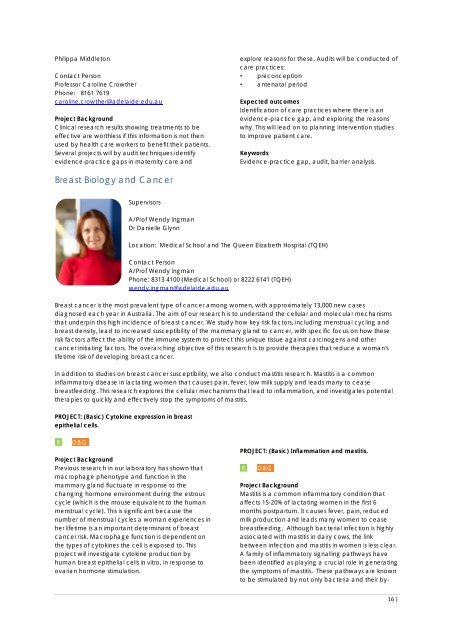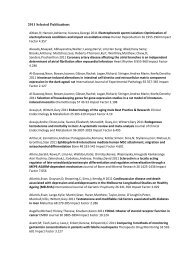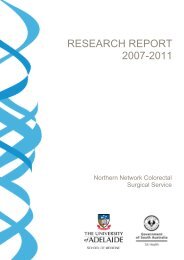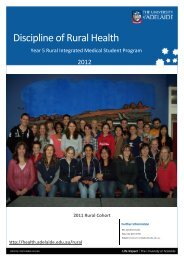Honours Project Book - Faculty of Health Sciences - University of ...
Honours Project Book - Faculty of Health Sciences - University of ...
Honours Project Book - Faculty of Health Sciences - University of ...
You also want an ePaper? Increase the reach of your titles
YUMPU automatically turns print PDFs into web optimized ePapers that Google loves.
Philippa Middleton<br />
Contact Person<br />
Pr<strong>of</strong>essor Caroline Crowther<br />
Phone: 8161 7619<br />
caroline.crowther@adelaide.edu.au<br />
<strong>Project</strong> Background<br />
Clinical research results showing treatments to be<br />
effective are worthless if this information is not then<br />
used by health care workers to benefit their patients.<br />
Several projects will by audit techniques identify<br />
evidence-practice gaps in maternity care and<br />
Breast Biology and Cancer<br />
Supervisors<br />
A/Pr<strong>of</strong> Wendy Ingman<br />
Dr Danielle Glynn<br />
explore reasons for these. Audits will be conducted <strong>of</strong><br />
care practices:<br />
• preconception<br />
• antenatal period<br />
Expected outcomes<br />
Identification <strong>of</strong> care practices where there is an<br />
evidence-practice gap, and exploring the reasons<br />
why. This will lead on to planning intervention studies<br />
to improve patient care.<br />
Keywords<br />
Evidence-practice gap, audit, barrier analysis.<br />
Location: Medical School and The Queen Elizabeth Hospital (TQEH)<br />
Contact Person<br />
A/Pr<strong>of</strong> Wendy Ingman<br />
Phone: 8313 4100 (Medical School) or 8222 6141 (TQEH)<br />
wendy.ingman@adelaide.edu.au<br />
Breast cancer is the most prevalent type <strong>of</strong> cancer among women, with approximately 13,000 new cases<br />
diagnosed each year in Australia. The aim <strong>of</strong> our research is to understand the cellular and molecular mechanisms<br />
that underpin this high incidence <strong>of</strong> breast cancer. We study how key risk factors, including menstrual cycling and<br />
breast density, lead to increased susceptibility <strong>of</strong> the mammary gland to cancer, with specific focus on how these<br />
risk factors affect the ability <strong>of</strong> the immune system to protect this unique tissue against carcinogens and other<br />
cancer initiating factors. The overarching objective <strong>of</strong> this research is to provide therapies that reduce a woman's<br />
lifetime risk <strong>of</strong> developing breast cancer.<br />
In addition to studies on breast cancer susceptibility, we also conduct mastitis research. Mastitis is a common<br />
inflammatory disease in lactating women that causes pain, fever, low milk supply and leads many to cease<br />
breastfeeding. This research explores the cellular mechanisms that lead to inflammation, and investigates potential<br />
therapies to quickly and effectively stop the symptoms <strong>of</strong> mastitis.<br />
PROJECT: (Basic) Cytokine expression in breast<br />
epithelial cells.<br />
R. O&G.<br />
<strong>Project</strong> Background<br />
Previous research in our laboratory has shown that<br />
macrophage phenotype and function in the<br />
mammary gland fluctuate in response to the<br />
changing hormone environment during the estrous<br />
cycle (which is the mouse equivalent to the human<br />
menstrual cycle). This is significant because the<br />
number <strong>of</strong> menstrual cycles a woman experiences in<br />
her lifetime is an important determinant <strong>of</strong> breast<br />
cancer risk. Macrophage function is dependent on<br />
the types <strong>of</strong> cytokines the cell is exposed to. This<br />
project will investigate cytokine production by<br />
human breast epithelial cells in vitro, in response to<br />
ovarian hormone stimulation.<br />
PROJECT: (Basic) Inflammation and mastitis.<br />
R. O&G.<br />
<strong>Project</strong> Background<br />
Mastitis is a common inflammatory condition that<br />
affects 15-20% <strong>of</strong> lactating women in the first 6<br />
months postpartum. It causes fever, pain, reduced<br />
milk production and leads many women to cease<br />
breastfeeding. Although bacterial infection is highly<br />
associated with mastitis in dairy cows, the link<br />
between infection and mastitis in women is less clear.<br />
A family <strong>of</strong> inflammatory signalling pathways have<br />
been identified as playing a crucial role in generating<br />
the symptoms <strong>of</strong> mastitis. These pathways are known<br />
to be stimulated by not only bacteria and their by-<br />
16 |





